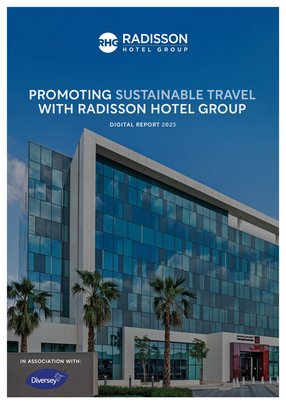Promoting sustainable travel with Radisson Hotel Group
After spending more than 12 years at Radisson Hotel Group, Inge Huijbrechts, Global Senior Vice President of Sustainability, Security and Corporate Communications, has witnessed first-hand how the company has developed into a business that is pioneering sustainability in the hospitality industry.
Now in 95 countries, Radisson Hotel Group (RHG) is a fast-growing hotel company, with over 1,200 hotels in operation and development. The group is also home to ten amazing brands that span economy stays, all the way up to luxury lifestyle options, as well as hotels ranging from those with 50 rooms to others that have thousands.
With even more growth plans for the future, RHG has set out a defined five-year plan with 29 initiatives. “The group has a very clear direction of where we are going in the future,” Huijbrechts says. “As a group, we’re focused on our continued expansion, while ensuring that we’re always improving our guest experience and exceeding their expectations. It’s also important for us to be an employer of choice as we have a lot of exciting roles to fill in the future.”
Although RHG has set a number of targets to boost its own sustainability journey, the group has also made a number of strategic partnerships to ensure it’s helping the industry as a whole progress. “We are part of some key associations, such as the Sustainable Hospitality Alliance, the World Travel and Tourism Council (WTTC), and the Energy and Environment Alliance to ensure we’re playing our part in helping the hospitality sector become more sustainable,” Huijbrechts says. “Each organisation has its own strengths to occupy a bigger ecosystem of change. As RHG wants consistency in sustainability, the business ensures it pulls together resources – even from its competitors – to make tools available for the industry and to drive a more sustainable, equitable future.”
Think People, Think Community and Think Planet
With Scandinavian roots, sustainability and responsible business have been at the top of RHG’s agenda for a long time, centred around three main pillars: Think People, Think Community and Think Planet.
Think People ensures the group is looking after and taking care of people in its hotels and supply chain, Think Community works to safeguard those in the community including individuals in underprivileged groups, and the Think Planet pillar focuses on minimising the group's footprint, while forging strong relationships with suppliers.
“Our work with the community focuses on ensuring that our hotels are engaged in the community,” Huijbrechts says. “It’s not just a matter of making donations, but it's also a matter of making sure that through the hotel business itself, we are supporting local communities through employability opportunities.”
“We work in many countries to create employability opportunities, either for jobs directly in our hotel in partnership with our hotels or other hotels in the destination, to encourage more people to continue both their personal and professional development. Sometimes, when underprivileged groups go through an employability programme, they’re able to get a job straight away, but other times, they realise they can pursue a hospitality management course, for example, and start higher up the ranks.”
However, the main focus is the group’s net-zero transformation. In 2022, RHG pledged to become net zero by 2050 and has since published approved science-based targets. Huijbrechts explains that these initiatives put RHG among the biggest companies in the world with concrete net-zero targets.
Additionally, since the COVID-19 pandemic, RHG has pledged to reduce its absolute carbon emissions by 46% – almost cutting them in half.
Huijbrechts explains that RHG is taking a number of steps towards reaching its net zero targets, including prioritising renewable energy and electricity. The business also operates as an ‘asset light’ company, which means the group doesn’t own any of the buildings that it operates in.
What’s more, to improve its supply chain, the business began work with the sustainable ratings company, EcoVadis to acquire a rating. Initially, RHG was certified with a silver level and is now close to obtaining gold. This tool enables RHG’s procurement teams to focus more on responsible sourcing while checking that its regional and main suppliers meet the EcoVadis evaluation.
Stakeholder trust with Build Planet guidelines
As RHG doesn’t own any of its hotels, the companies that do are among a key group of stakeholders for the business, and approximately one-third of RHG is a growing franchise. “With external parties, we focus on renewable energy, green operations and green buildings,” Huijbrechts says. “Our messaging towards owners is specifically about the net zero transformation and how they can green the buildings with our support.
“We have defined our ‘Build Planet’ guidelines which focus on the highest standards of sustainability available to bring buildings up to the standards of BREAM, depending on where they are in the world. Hotel owners can then choose one of these certifications directly, to ensure any asset they have in their portfolio will be BREAM certified, for example.”
Hotels that are unsure of how to navigate this can use the Build Planet guidelines as a step-by-step reference guide on how to achieve these standards. Owners are also supported by RHG with training options.
RHG’s other key stakeholder group is its employees. “We have a very active network of employees engaged in sustainability,” Huijbrechts says. “First of all, we have two key training platforms available to everyone – one is leading responsible business and the other is living responsible business. These are both part of a new hire orientation as well as a repetitive training, meaning all employees are aware of sustainability targets and are engaged in different campaigns.”
Last but not least, Huijbrechts discusses the customers, as stakeholders. “Year on year, surveys highlight that the demand for sustainable travel is increasing,” she says. “However, it’s also highlighted that customers don’t necessarily know what it means for a hotel to be sustainable, and how to recognise them.”
To counter this issue, RHG launched the ‘Hotel Sustainability Basics’, in 2022, together with WTTC and the Sustainable Hospitality Alliance. The Hotel Sustainability Basics was formed by a number of different parties agreeing to a set of twelve criteria that a hotel needs to fulfil in order to market itself as sustainable. The programme marks the starting point of a hotel's sustainability journey and is linked to a verification programme to eliminate any potential greenwashing.
“The Hotel Sustainability Basics programme is a great way of getting all the hotels on the same page to start their sustainability journey,” Huijbrechts explains. “We also communicate to our guests about this, so when they see the logo, they’ll know that they’re staying at a hotel they can trust is sustainable.”
Breaking ground in the DEI space
Although hospitality is a diverse industry by nature, RHG has still made it a focal point to prioritise DEI initiatives. To do so, the group promotes local talent and encourages more women to take senior leadership positions. The group has pledged to reach a 50/50 gender split in senior leaders by 2050.
“We need to show women that we do support them by providing them with the right encouragement, mentors and educational tools, but we also need to build their confidence in knowing that they can have a healthy work-life balance,” Huijbrechts remarks.
In doing so, Huijbrechts explains that the group has “taken away some rules” to ensure the hiring process is fair and inclusive. For example, RHG used to have an unwritten rule in which new General Managers were positioned in challenging, more remote locations, which can be difficult for those raising a family. Realising this, the group removed the rule, to ensure every candidate and employee had a fair chance of reaching success. Through these operational changes, RHG has seen an increase in the number of women joining the company and is confident that this will continue.
Another incentive added to attract more women to join the business was RHG’s move to expand paid maternity leave in certain areas, for example, in the UAE. The group also had the first-ever female General Manager in Saudi Arabia, who was a Saudi native. “This was a groundbreaking achievement,” Huijbrechts exclaims. “Before we hired her, we actually needed to check behind the scenes with the government to ensure we were legally allowed to do so.”
By employing just one woman from Saudi Arabia into a leadership position, more women were encouraged to take similar roles. Now, more than 200 women are in leadership positions in Saudi Arabia, something that wasn’t possible before.
In the future, Huijbrechts and RHG look forward to creating even more ground-breaking revelations, both in terms of DEI and sustainability, to ensure the business continues on as an industry leader.



